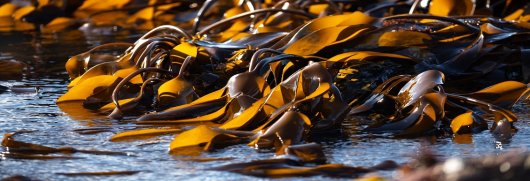SEASOLUTIONS

Seaweeds and seaweed-ingredients to reduce enteric methane emissions from pasture based sheep, cattle and dairy cows
The drive to become more efficient is viable and well in the food industry and this trend has been altered in recent years by the challenge of making our advancements more environmentally friendly. Meat and dairy production have become targets of much scrutiny and blame in the charge against global warming. By 2050, the EU aims to cut its emissions by 80-95%. Livestock are responsible for 44 % of all methane emissions and methane has 36 times the global warming potential of carbon dioxide. Recent research in Australia demonstrated that feeding the seaweed Asparagopsis taxiformis to sheep at 2% the dry weight of feed resulted in 50- 70% less methane release over a 72-day period continuously. SEASOLUTIONS will investigate the potential of native, harvested seaweeds to reduce enteric methane emissions from sheep, beef and dairy cattle. It will help to gain a fundamental understanding of the mechanism of action of methane reduction in the rumen; effects on animal health and foods produced and the economic, economic viability of using seaweed components to reduce methane emissions.
Coordinator
TEAGASC - Agriculture and Food Development Authority, TEAGASC, Ireland
Maria Hayes
Project partners
Agri-Food and Biosciences Institute (AFBI), UK
Queen's University Belfast (QUB), UK
Friedrich-Loeffler-Institut (FLI), DE
Institute of Technology Sligo (ITS), IE
SINTEF, NO
The Norwegian Institute of Bioeconomy Research (NIBIO), NO
Swedish University of Agricultural Sciences (SLU), SE
Agriculture and Agri-Food Canada (AAFC), Canada
Total requested funding 1,969,000 €
Start-end date 06.01.2020-05.01.2023
Project duration 36 months
Project website and social media
- Unfortunately, your cookie settings do not allow videos to be displayed. - check your settings
NEWS from SEASOLUTIONS
2021.11.19
Can seaweed reduce methane emissions in ruminants?
Reducing methane from livestock is of the key challenges that faces the livestock sector in reaching climate goals. FACCE ERA-GAS project SEASOLUTIONS has been working on how seaweed additives to livestock feed can help reduce methane emissions. The coordinator of SEASOLUTIONS, Dr. Maria Hayes, this week talked to the Irish channel RTE on the programme ''10 Things to know about...'' which focused on seaweeds.
Dr. Maria Hayes tells RTE: "We have identified some brown seaweeds that are very positive and they're producing results," said Maria Hayes, Project Lead of the Sea Solutions project, whose team has achieved methane reductions of between 11% and 20% in early trials. "The reductions aren't going to be a silver bullet ... but it can significantly reduce emissions."
If you want to know more about this research, you can read more about it here and here.
